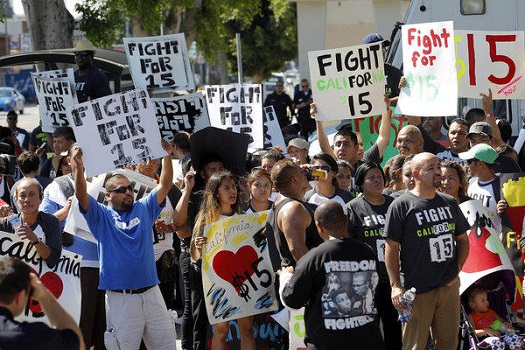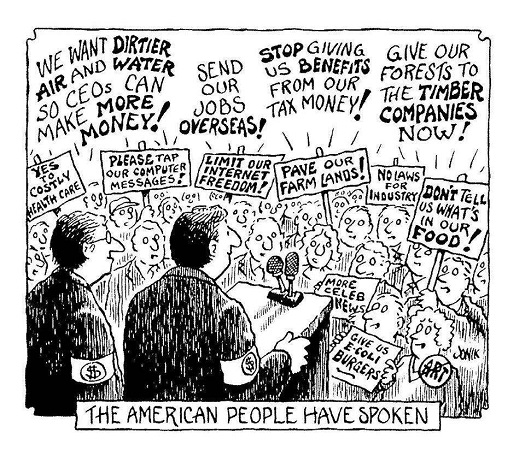
There has been a ton of negativity spewing out of the wake of Tuesday’s election, especially from all my liberal Democratic friends. I get it. My posts lately have been pretty negative, talking about how fear motivates voting and how there is a lot of unnecessary doom and gloom about the Republican Senate which will, ultimately, not change much, if anything.
But is that really the whole story? Is that what the midterm elections of 2014 have to tell this country?
This cartoon has been a really popular summation of the feelings of a lot of people I know:

The assumption here is that if people really understood the Republican agenda, they’d never vote for it. I think it also broadly misses the point that the Democratic agenda is largely similar. Issues like surveillance, Internet regulation, the deregulation of literally everything else, and a pro-corporate agenda (sometimes under the guise of “helping the economy”) find no or virtually no difference between the parties that comprise nearly all of our elected representatives. No one is speaking out for the poor, for the bombed, for the people who really need help.
And yet there is another story to the midterm elections. It is not just a sweeping Republican landslide that gives them control of both houses of Congress. It is the story of cities and states, some of them as liberal as Alaska, Nebraska, South Dakota, and Arkansas, who all overwhelmingly supported an increase in the minimum wage. This is not an issue that Democrats have traditionally championed or particularly endorsed, though some are coming around to it slowly. This is an issue that is to the left of both parties in the United States right now, yet enjoys overwhelming support in hard-core red conservative states.
Or then we have the legalization of marijuana passing in, again, Alaska, joining Oregon, DC, Washington, and Colorado. Yes, three of those places are extremely left-wing areas, but Colorado just turned their Democratic Senate seat red and nearly elected a Republican Governor as well. No major party nor any of its candidates are endorsing marijuana legalization – it is far to the left of even the most fringe Senator or Governor. (Okay, I guess one Oregonian Senator supports it officially. One. There’s also a Socialist in the Senate, so one is the loneliest number.) How can these red and reddish states be supporting something that is so radically leftist that no politician will touch it? Are American voters that stupid?
No, they’re just upset and don’t know what to do.
When people are upset, if they vote, they tend to go to the polls to try to protest, to vote against people as I discussed a couple days ago. This is why midterm elections in modern America always go against the sitting President, especially in their second term. This is why Hamas won the second round of parliamentary elections in Palestine. Everyone in the West freaked out and said everyone’s becoming a terrorist! Not so. There were two major parties – Fatah and Hamas – and people were upset with Fatah’s governance. So they tried the alternative. This is how two-party systems work (“work”): people see-saw back and forth between the parties when they’re unhappy with what’s going on.
And people are unhappy. They hate Obama, they really hate Congress, they feel extreme ennui with the fake recovery that’s only benefiting the corporate elites, they feel media-fueled fear of ridiculous things. Voter dissatisfaction is massive. Very few people even bothered with voting, an even larger expression of angst and disengagement. Where they did, third parties and outcasts did pretty well.
But for those who still believe in voting, the party machines have done a good job of convincing people that their only two choices are (D) and (R), no matter what the policies represented by those parties reflect. And enough people feel some loyalty to that system that they keep going out and slogging for their folks and against the others, no matter what the consequences may be. Even most of the youngest voters don’t believe third parties will ever be a credible threat to the party machines, so they go out and flip back and forth between them and wonder why they never get any happier.
The problem is the parties, sure, but it’s also the people. Not the voters, actually – what they are doing with extremely limited options truly makes sense. It’s the politicians. It’s the age-old reality that when you have people who choose to seek power and advancement, they are particularly ill-suited to wield it. And when you add corporate capitalism in the 21st century to the mix, plus Citizens United and the unbridled principles of corporate personhood and money as speech, you get a real disaster. You get a “representative” body that is completely beholden to the highest bidder, utterly for sale, and completely out of touch with the actual wishes of the average voter or real person in the society. It’s not a coincidence that most major corporations donate liberally to both sides of the aisle and have a tendency to pick winners, nor that Congress is unable to agree on any policy most of the time until it’s time for a corporate bailout or a new war, in which case everyone trips over each other to fall in line. The corporations are buying our government and the government’s policies, in both parties, have drifted far to the right of where the people actually stand.
So when you look at these results, it’s not schizophrenia or insanity that you are seeing among voters. When they have actual issues to vote on, they skew radical. When they are facing elected representatives, they usually just try to muddle through with the evil they’ve tried less recently. Or, if they like a dynamic and popular figure in their town, usually their House representative, they keep sending them back. After all, most polls show that everyone despises the House as a whole, but kinda loves their own personal representative. Not, mind you, because they actually represent their interests or views, usually, but because they’re familiar and personable and local.
It should also probably be noted (before I get angry rebuttals to my thesis) that staunchly social issues like same-sex marriage and abortion are subject to fundamentalist Christian rallying for popular referenda and probably skew the other way. Even California passed Prop 8 when I lived there and the fundamentalist base has a tendency to get really fired up about making social laws look more like the Old Testament, or whatever their current reading of it is that day. Although I’m not sure these referenda against same-sex marriage would even pass in five years – the majority of the American populous now supports same-sex marriage and as soon as the Millennials fully replace the WWII generation at the polls, I think that fate will be sealed. That said, thank goodness for courts in the system of checks-and-balances for constantly correcting extreme social conservatism.
What’s the overall point, though? It’s that representative democracy has failed us. Yes, I know the founding fathers intended representative democracy and the electoral college to save us from ourselves. You know, the founding fathers who owned slaves and didn’t think of women as people and denied even white men the franchise if they didn’t own land. Yeah, those guys were kind of elitist. And by “kind of,” I mean “completely.” This system has always been designed to deny the people what they want. That denial was just a lot less pernicious when representatives felt really accountable and beholden to voters, rather than to the corporations that paid for said voters.
You don’t need to look a lot further for evidence of the American hunger for strong progressive/radical leadership than the success of the two Obama campaigns. Despite no intention whatsoever to make good on leftist policies, Obama was handily elected twice on the back of staunchly progressive rhetoric. It wasn’t just Democrats who voted for him, either – he needed plenty of Republicans and Independents to champion his cause of hard-core radical change. It’s pretty well documented that his policies have been aligned with or slightly to the right of George W. Bush, especially on foreign policy, and his one allegedly grand progressive vision (Obamacare) used a model that was originally drafted by the Heritage Foundation and first implemented by Mitt Romney. Like so many Republican solutions, it utilized the market as the only mechanism, gave all the power to corporations, and just made it illegal not to have health insurance, a privately-sold product. As progressives who originally opposed individual mandates in healthcare pointed out (before many of them were quieted by having to get in line behind the allegedly leftist President), this is like solving hunger by making it illegal to not buy food on the open market.
Or how about the fact that most people, when surveyed, want foreign aid reduced to about 10% of the budget when it is actually only 1.4% of the budget to begin with. Or that people think wealth distribution should be far more even than even the most radical restructuring would create? Hopefully we’ve all seen this video by now:
16 million people have seen that video. About 42 million Americans voted two days ago. We should run one election cycle where all campaign advertising on television is replaced by showing that video.
The problem is, nothing would change, outside of ballot referenda. Because no politicians on the corporate dole are willing to even begin to discuss wealth distribution issues. No one will touch it, just like other widely popular things like the minimum wage or legalizing pot.
People always say “work within the system” and “change from within” when I bring up issues like this. The problem is that it’s the system itself that doesn’t work. It serves the elites. It was always meant to serve the elites, but even the founding fathers couldn’t have dreamt of corporate titans that would make the wealth of their contemporary kings look like amateur entrepreneurs. The nature of power is to consolidate and snowball and at the point where regulation is handled by a government that is for sale, there is nothing to stem the tide of that momentum.
The best hope we seem to have is for direct democracy. It wouldn’t fix all of our problems – there’s the social conservatism of denying rights to gay couples, women, and immigrants that I discussed above. And direct democracy would still be highly susceptible to a fear-mongering media that convinces us that the next terrorist threat is infinitely more vicious, bloodthirsty, and irrational than the last one, no matter how much American training and weaponry they were given by our previous administration. This wouldn’t solve everything.
But as far as our socio-economic issues, the fundamental structure of a society that is rapidly becoming a kleptocratic corporate slave-state, those would be held off by taking votes straight to the people and skipping the middleman. Because the middleman is always going to look out for himself first, especially as he becomes more powerful and more acclimated to life at the top of the food chain.
I guess there are things within the system we can do in some places. Heck, San Francisco, with the strong support of my old workplace, just passed $15/hour minimum wage! If you live in a place that allows ballot referenda, get radical ones put on the ballot. Honestly, the more radical the better. If you don’t, then work to try to open up more opportunities for direct democracy.
The people are not the problem. The politicians are the problem. And making more people into politicians, with very few rare exceptions, isn’t going to fix things. Nor is just voting out whoever happens to be in at the time, as satisfying as that might feel on Election Day. We need a more radical change to overhaul the direction of the nation and its policies. Fortunately, the people are already pretty radical, at least compared to the parties that allegedly represent us.


